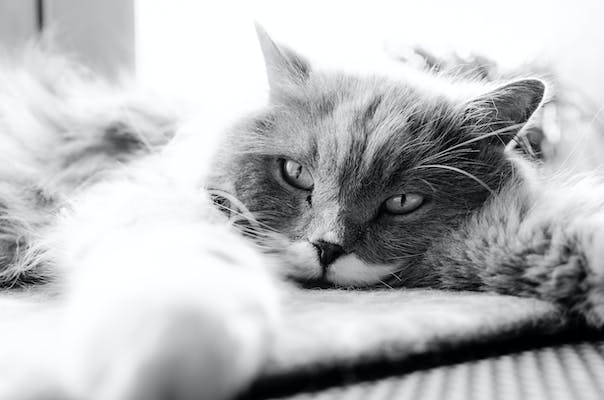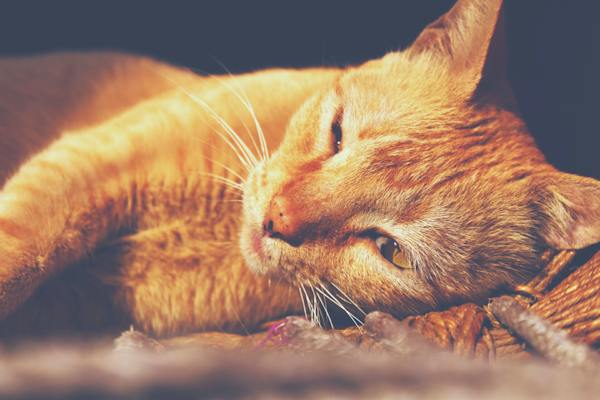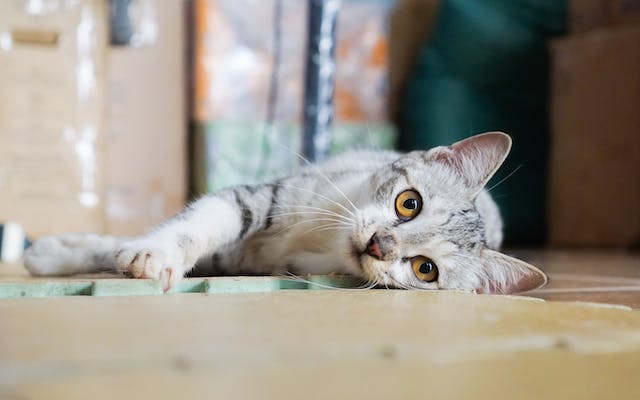Today, we’re going to tackle a concern that’s been bugging cat lovers everywhere – when your feline friend is feeling lethargic and refusing to eat or drink.
It’s a worrisome situation, but fear not, because in this article, we’ll explore the possible reasons behind this behavior and share some tips to help your kitty get back on track.
So, let’s dive in and get those purrs and meows back in action!
Why is My Cat Lethargic Not Eating or Drinking
A cat may be lethargic and not eating or drinking due to various reasons, including illness, pain, or a change in environment. Stress or anxiety can also contribute to a lack of appetite and energy in cats.
It is important to monitor the cat’s behavior and consult a veterinarian if the symptoms persist for more than 24 hours or if there are other concerning signs such as vomiting or diarrhea.
Read more about feeding a cat that is vomiting and diarrhea.
Reasons Why a Cat May be Lethargic Not Eating or Drinking

Here are some of the potential reasons why a cat may be lethargic not eating or drinking:
1. Stress or Anxiety
Cats are sensitive creatures, and various stressors can lead to a lack of appetite and lethargy. Changes in their environment, such as moving to a new home or the introduction of a new pet, can cause stress.
Even smaller disruptions like rearranging furniture can affect them. It’s important to provide a safe and quiet space for your cat to retreat to if they’re feeling overwhelmed. Additionally, interactive toys and gentle playtime can help alleviate stress and engage their natural instincts.
2. Illness or Infection
If your cat is not eating or drinking and appears lethargic, it could be a sign of an underlying health issue. Infections, viruses, or diseases can affect their overall well-being. Common problems include respiratory infections, urinary tract infections, or gastrointestinal issues.
Regular vet check-ups are crucial to detect and address these problems early. If your cat displays unusual symptoms, like vomiting, diarrhea, or a change in litter box habits, consult your veterinarian promptly. Timely medical attention can make a significant difference in their recovery.
3. Dental Problems
Dental issues can often go unnoticed but have a profound impact on a cat’s eating habits. If your cat has dental pain or discomfort, they may avoid eating altogether. Dental problems can include gum disease, tooth decay, or broken teeth.
Regular dental check-ups are essential to catch these issues early. Providing dental-friendly treats and toys can also help maintain their oral health. In severe cases, your veterinarian may recommend a dental cleaning or extractions.
Read more about why your cat might stop eating.
4. Hairballs
Hairballs are a common issue in cats, especially those with long hair. When cats groom themselves, they ingest loose hair, which can accumulate in their stomach and form hairballs.
Hairballs can cause discomfort and lead to a lack of appetite and lethargy. If a cat is unable to expel the hairball through vomiting or passing it in the stool, it can cause a blockage in the digestive tract, which requires immediate veterinary attention.
5. Gastrointestinal Issues
Various gastrointestinal issues can contribute to a cat’s lethargy and loss of appetite. Inflammatory bowel disease (IBD) is one such condition that affects the digestive system of cats.
It is characterized by inflammation in the intestinal wall, leading to symptoms such as vomiting, diarrhea, weight loss, and lethargy. Other gastrointestinal issues, such as gastroenteritis, tumors, poisoning, and endocrine diseases, can also cause similar symptoms.
6. Parasites
Parasites, such as intestinal worms, can affect a cat’s overall health and appetite. Gastrointestinal parasites can cause vomiting, diarrhea, weight loss, and lethargy in cats.
Common parasites that affect cats include roundworms, hookworms, and tapeworms. Regular deworming and preventive measures recommended by veterinarians can help control and prevent parasite infestations.
7. Allergies
Cats can experience allergies, which can lead to lethargy and a loss of appetite. Allergies in cats can be caused by various factors, including food allergies and environmental allergens such as pollen, dust mites, or certain cleaning products.
Food allergies occur when a cat’s immune system reacts to a specific ingredient in their diet. Environmental allergies can cause symptoms such as itching, sneezing, and gastrointestinal issues, which can result in a lack of appetite and energy.
8. Side Effects of Medications
Certain medications can have side effects that may cause a cat to become lethargic and lose their appetite.
For example, medications like lithium, alprazolam, and seizure medicines can cause tiredness, stomach upset, and dizziness If your cat is on any medications, it’s important to consult with your veterinarian about potential side effects and how to manage them.
9. Feeding Issues
Feeding problems can be a common reason for a cat’s lethargy and reluctance to eat or drink. Cats can be finicky eaters, and changes in their feeding routine or environment can stress them out.
For example, if you’ve recently switched their food brand or type, they might not like the new taste or texture. Also, the location of their food and water bowls can matter; if it’s near their litter box or in a noisy area, they might feel uncomfortable.
What to Do if Your Cat is Lethargic Not Eating or Drinking
If your cat is lethargic and not eating or drinking at home, it is important to take action quickly. First, assess the situation by checking for any obvious signs of illness or injury.
If you notice anything concerning, contact your veterinarian immediately. In the meantime, try enticing your cat with different types of food or treats to encourage eating.
Ensure that fresh water is always available and consider offering wet food or adding water to dry food to increase hydration. Create a comfortable and quiet space for your cat to rest and monitor their behavior closely.
If there is no improvement within 24 hours, seek professional veterinary advice to determine the underlying cause and appropriate treatment.
Treatment Options for a Cat Lethargic Not Eating or Drinking

When a cat is lethargic and not eating or drinking, it is important to address the issue promptly as it can be a sign of an underlying health problem.
Here are some of the major treatment options that can be considered:
1. Veterinary Examination and Diagnosis: The first step is to take your cat to a veterinarian for a thorough examination. The vet will evaluate your cat’s overall health, perform diagnostic tests if necessary, and determine the underlying cause of the symptoms. This is crucial for developing an appropriate treatment plan.
2. Fluid Therapy: If your cat is not drinking, it may become dehydrated. In such cases, fluid therapy may be necessary to restore hydration. This can be done through intravenous (IV) fluids administered by a veterinarian. In some cases, subcutaneous fluids may be prescribed, which can be administered at home under veterinary guidance.
3. Medications: Depending on the underlying cause of the symptoms, your veterinarian may prescribe medications to address specific issues. For example, if the cat has an infection, antibiotics may be prescribed. If there is pain or inflammation, pain medications or anti-inflammatory drugs may be recommended. It is important to follow the veterinarian’s instructions and administer medications as prescribed.
4. Nutritional Support: Cats that are not eating may require nutritional support to prevent malnutrition. This can be achieved through various methods, such as syringe-feeding a liquid diet or using a feeding tube. Your veterinarian will guide you on the best approach based on your cat’s condition and needs.
5. Addressing Underlying Health Issues: The treatment plan will depend on the specific underlying health issue causing the lethargy and loss of appetite. For example, if the cat has diabetes, managing blood sugar levels through diet, medication, and lifestyle changes may be necessary. If the cat has hyperthyroidism, treatment options may include medication, radioactive iodine therapy, or surgery. It is important to follow the veterinarian’s recommendations for managing the specific condition.
6. Supportive Care: Along with the specific treatments mentioned above, providing supportive care is essential. This includes creating a comfortable and stress-free environment for the cat, ensuring access to fresh water, and offering tempting and nutritious food options. Regular monitoring of the cat’s condition and follow-up visits to the veterinarian are also important to track progress and make any necessary adjustments to the treatment plan.
It is important to note that the specific treatment options for a lethargic cat not eating or drinking will depend on the underlying cause, and it is crucial to consult with a veterinarian for a proper diagnosis and treatment plan tailored to your cat’s individual needs.
Frequently Asked Questions
My cat seems lethargic and is not eating or drinking. Should I be worried?
It’s important to pay attention when your cat shows signs of lethargy and loss of appetite. While there can be various reasons for these symptoms, it’s always best to consult with a veterinarian to rule out any underlying health issues.
What could be causing my cat to lose its appetite and energy?
There are several possible causes for a cat’s loss of appetite and lethargy. It could be due to an underlying illness, dental problems, stress, changes in the environment, or even a reaction to medication. A veterinarian can help determine the exact cause.
How long can a cat go without eating or drinking before it becomes a concern?
Cats are generally resilient, but it’s not ideal for them to go more than 24-48 hours without eating or drinking. If your cat refuses food and water for an extended period, it’s crucial to seek veterinary assistance promptly.
Can I try to entice my cat to eat or drink on my own?
While it’s natural to want to help your cat, it’s best not to force-feed or offer unfamiliar foods. Instead, try tempting your cat with their favorite treats or wet food. If your cat still refuses, it’s essential to consult a vet.
Are there any home remedies I can try before visiting the vet?
While there are some home remedies that may help stimulate your cat’s appetite, such as warming up their food or offering low-sodium chicken broth, it’s crucial to remember that these are temporary solutions. If the loss of appetite persists, it’s best to consult a veterinarian.
How can I prevent my cat from becoming lethargic and losing its appetite?
Maintaining a regular feeding schedule, providing a stress-free environment, and ensuring your cat has access to fresh water are essential for their well-being. Regular check-ups with your veterinarian can also help identify any underlying health issues early on.
Read more about the hydration of a cat that won’t drink.
Conclusion
So, if you find your furry friend feeling under the weather, with a lack of appetite and thirst, don’t panic just yet. Cats can be finicky creatures, and sometimes, a little bit of extra TLC is all they need. Keep an eye on their behavior, offer tempting treats, and if the symptoms persist, don’t hesitate to consult your veterinarian for further guidance. Remember, a little love and care can go a long way in helping your lethargic feline get back on their paws!

